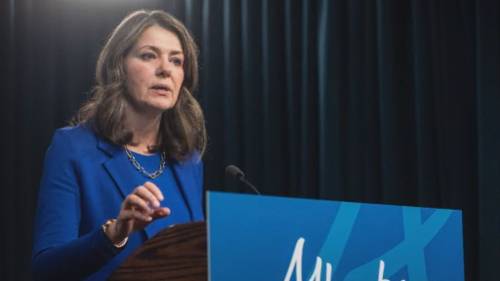In a defiant stand that has intensified Alberta’s already heated political landscape, Premier Danielle Smith doubled down on her government’s controversial transgender health care legislation, declaring unequivocally that the province is “on the side of kids” as legal challenges loom on the horizon.
“We’re prepared for the legal fight,” Smith stated during a recent press conference, her tone resolute as she defended Bill 7, the legislation that restricts gender-affirming procedures for minors under 16 and imposes strict parental consent requirements for those aged 16-17. “Our government believes these measures are necessary protections for vulnerable youth making life-altering decisions.”
The legislation, formally called the “Protecting Children’s Health Act,” has created deep divisions across Alberta’s political spectrum, with medical associations, LGBTQ+ advocates, and civil liberties organizations mobilizing against what they describe as dangerous government overreach into healthcare decisions.
Dr. Melanie Thompson, president of the Alberta Medical Association, expressed profound concern about the bill’s implications. “This legislation contradicts established medical protocols and puts vulnerable youth at significant risk,” she told CO24 in an exclusive interview. “Gender-affirming care is evidence-based medicine, not ideology.”
The controversy extends beyond Alberta’s borders, reflecting a broader pattern of similar legislation introduced in conservative jurisdictions across North America. Political analysts note this represents part of a coordinated strategy to energize conservative base voters ahead of upcoming electoral contests.
Legal experts are already questioning the bill’s constitutional standing. Constitutional lawyer Sarah Ramirez points out: “The legislation potentially infringes on both healthcare jurisdiction and equality rights protected under the Charter. The courts will likely scrutinize whether these restrictions constitute unjustifiable discrimination.”
Data from the Canadian Mental Health Association indicates transgender youth face disproportionately high rates of depression, anxiety, and suicidal ideation when unable to access appropriate care. Studies consistently demonstrate that gender-affirming treatments significantly reduce these risks—evidence critics say the Alberta government is willfully ignoring.
Families directly affected by the legislation have begun speaking out. Jennifer Carson, mother of a 15-year-old transgender son in Calgary, described the bill as “devastating.” “My child was finally thriving with proper medical support. Now the government is inserting itself between my family and our doctors,” she explained, her voice breaking. “This isn’t about protecting children—it’s about politics.”
Premier Smith, however, remains unmoved by such criticism. “Parents deserve to be involved in major medical decisions for their children,” she asserted. “We won’t back down from protecting young Albertans from potentially irreversible procedures before they’re mature enough to fully understand the consequences.”
The bill has created unusual political alignments, with some traditional conservative voters expressing discomfort with government intervention in medical decisions while progressive activists organize unprecedented protests in Edmonton and Calgary. Meanwhile, the healthcare community finds itself caught between professional ethics and new legal requirements.
As legal challenges take shape, the question remains: will Alberta’s courts ultimately side with medical consensus and individual rights, or with the government’s asserted interest in parental authority? The answer will have profound implications not just for transgender youth in Alberta, but potentially for similar legislative efforts across Canada and beyond.
In a political climate where transgender healthcare has become an increasingly contentious battleground, Alberta now stands at the epicenter of a conflict that transcends provincial politics, raising fundamental questions about who should control healthcare decisions: patients and doctors, parents, or the state?










